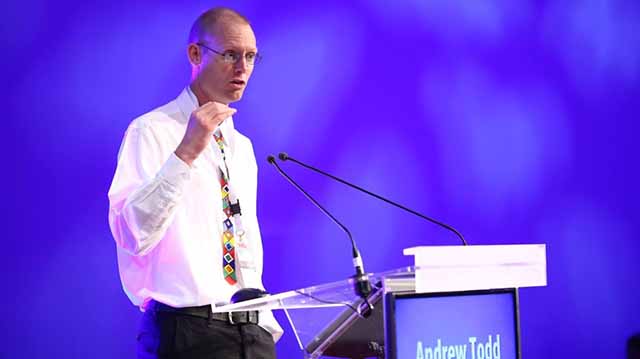
By Yamkela Ntshakaza, first-year BMus student
The International Ergonomics Association (IEA) Congress, held in Florence, Italy from 26 to 30 August, is the largest meeting of ergonomics researchers and practitioners in the world. Rhodes Human Kinetics and Ergonomics (HKE) lecturers Andrew Todd and Dr Jonathan Davy represented the University and South Africa at the Congress.
Todd attended in his capacity as Chair of the International Development standing committee of the IEA and as a member of ErgoAfrica (the network of African Ergonomics Associations), while Dr Davy represented the Ergonomics Society of South Africa of which he is the Vice President, and as a member of the executive for the BRICS (Brazil; Russia; India; China; South Africa) network of ergonomics societies.
The aim of the Congress was to synthesise ideas and debate matters involving ergonomics, and to build on key needs and perspectives from various regions of the world. During the closing stages of the congress, Todd and Dr Davy were asked to comment on matters pertaining to research, education and practice from their respective regions.
“I represent the BRICS network,” Dr Davy explained. “We recommended that we need to be mindful of the growing informal or invisible economy and find ways in which we can assist. We must also be mindful of the impact technological developments have on the way we work and live, and how disruptive technologies may affect work and life outside of work.”
From Todd’s African cluster, research areas such as technology transfer at all levels within the system on the African continent and an acknowledgement of the unique characteristics of various African populations, were taken into account.
According to Todd, “There is increasing emphasis on the systematic nature of HFE (Human Factors and Ergonomics) and work environments, and how it can contribute to broader issues pertaining to global sustainability and resilience.”
South Africa has a vital place in the global ergonomics community and the work is of high value. Todd is the second individual from Rhodes University to serve as Chair of IEA’s International Development Committee, after Professor Pat Scott, who headed the department for many years while at the University. It was clear that the prestigious roles played by both Todd and Dr Davy within the global industry is further evidence of the value placed on South African contributions to ergonomics.
Dr Davy is confident that as additional opportunities for collaboration with the world arise, there will, in turn, be more opportunities for Rhodes academics and students to gain recognition. Dr Swantje Zschernack, the current head of the HKE department, and two senior postgraduates, Luke Goodenough and Hayden Searle have contributed significantly to ergonomics through the Department of HKE, and all were present at the Congress. “This kind of experience gives our staff and students a global perspective within their field of study. It shows them what is possible while teaching them to appreciate diversity and gears them up to better overcome future challenges within ergonomics in South Africa,” Dr Davy explained.
Both lecturers agree attending the Congress was a great way to put Rhodes on the map. “It shows that, despite the fact that we are a small university, when it comes to ergonomics research, we are right up there with the rest of the world,” Dr Davy proclaimed.
